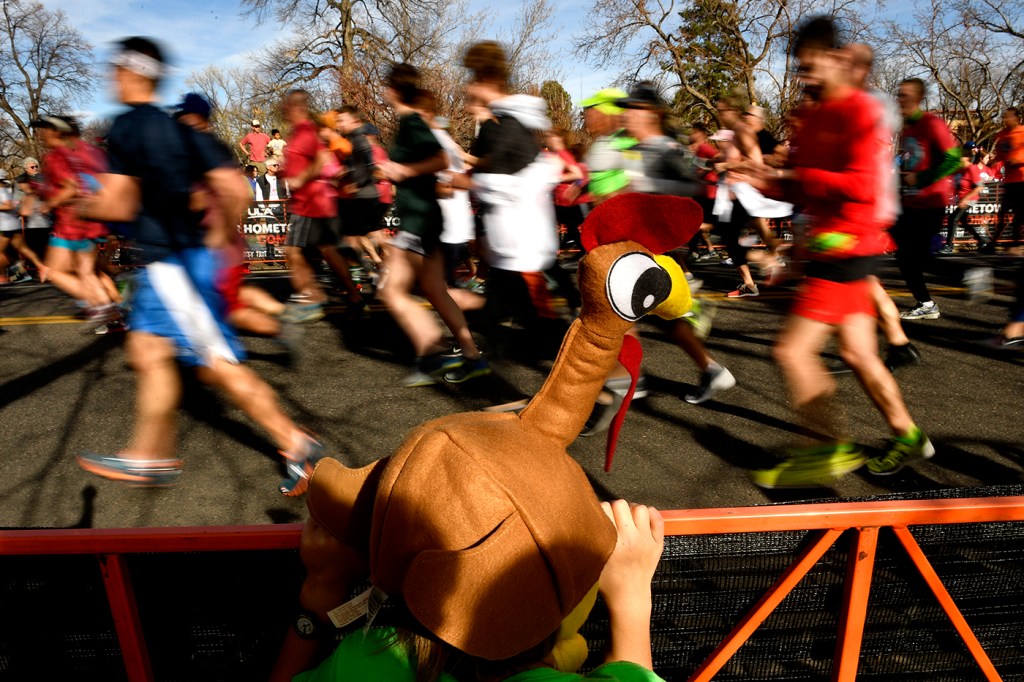No, you don’t have to ‘earn your meal’ this Thanksgiving

Anyone running a turkey trot this Thanksgiving might notice a troubling component to the race marketing: diet culture.
Races are happening across the country this Thanksgiving season, with some encouraging runners to use it as an opportunity to eat guilt free, to burn off their pre-Thanksgiving meal calories, or to “earn their turkey.”
While this language may seem innocuous, it isn’t helpful for those who are struggling with body image and eating issues, Rachel Rodgers, an associate professor of applied psychology at Northeastern, says.
It’s also not new or uncommon, Rodgers says, as part of a two-pronged approach to food marketing: Consumers are encouraged to indulge during the holiday season, while also being told to “earn” their meals or to feel guilty about eating.
What is the impact of messages like these, and how can people take care of themselves during this time? Here’s what Rodgers had to say. Rodgers’ comments have been edited for clarity and brevity.
What is your reaction to the marketing of Turkey Trots that are geared toward “earning your meal?”
It’s all related to guilt and the idea of weight control. And that food is something that you should spend most of your time resisting and only ever indulge in if you really have atoned for it before or after.
What is the impact of those messages?
I think it fits into the broader diet culture, a pressure to use food as a way to manipulate weight and shape and genuinely consider it as the enemy, which is not a helpful stance.
Do you see this as a trend in diet culture?
Marketing trends come and go in order to be effective; it needs to be perceived as being new. And so things tend to cycle; there isn’t really anything new. There’s an illusion of this as a new trend or a new aspect, but it’s basically just the same thing.
Food marketing has a tension between the marketing of things that are being represented as very, very appetizing and tempting, and things that are being represented as things you can eat without guilt, and that will help you regulate your weight and shape. And most often those products are being sold by the same companies.
There is this push and pull—you should consume, this is going to be really delicious, go for it. And then there’s, Oh, but hang on. Let’s see how we can do that and be worried about our weight at the same time. And we’ll call it a holiday.
Some people might say, what’s the point of exercising if you’re not working off calories? Why do we bother? What do you think about that?
I tend to think about exercise a bit differently. We know that exercise can be done from different mindsets, and that if you’re approaching exercise with a mindset of, how is this gonna make me look better, that tends to be associated with poor outcomes. It may be effective in the short term, but that creates a dependence on maintaining a rigorous regimen of exercise in order to continue to look the way that people want to. That is dangerous because you can end up exercising even if you’re hurt, it creates a lot of anxiety if you think that you’re not going to be able to keep up your exercise, etc., etc.
Whereas we see that exercise that is engaged in for social benefits or from an embodied perspective of being attuned to what’s going on in your body and enjoying the sensations, tends to be associated with much more positive outcomes in terms of mental health and just overall physical benefits.
How would you react to someone who says that it’s an overreaction to say that these messages are harmful?
It’s never black or white, right? They are probably right that for lots of people, this type of message will not be acutely harmful. And there’ll be a small group of people for whom this will be very triggering. At the global level, it’s not harmful to most people, just because it’s so normalized. It’s a repetition of things that they’re seeing everywhere in all shapes and forms. That doesn’t mean that it’s a good message. It just means that it’s one that’s so pervasive, that to some extent, you don’t even notice it anymore.
Are there any positive trends that you’re seeing out there in terms of body positivity?
In terms of Thanksgiving dinners, anything that is more related to intuitive eating, to celebrating the sharing of food with families, its social meaning, its relational meaning, as well as eating in a way that is guided by taste and internal satiety cues, is always more helpful. That’s not a message that you can distill in kind of a catchy, you know, tagline, oftentimes.
What advice would you give to somebody who’s struggling with body image issues and holiday stress?
I would say, first of all, that’s entirely understandable. Far more people find holidays stressful than you would imagine. So give yourself grace. Remember that a lot of these diet culture messages stem from for-profit companies. And so if you’re feeling a certain way, that’s because they’re trying to get you to feel a certain way, because that drives consumption.
And then, you know, most people have activities that help them to regulate and be more mindful. Just remember to engage in self care and try to stay clear of the black and white thinking of, Oh, I did this. Now everything’s off track.
What other issues are you thinking about as we head into the holiday season as a whole?
It is a stressful time in many ways for people. I think that often when we get stressed, it becomes harder to take the time to do self care. It’s that balancing act between recognizing that this is a time when you might feel stressed and accepting that that’s okay.
There are a lot of expectations socially about holidays being a time of joy, and when things go right. Just remember that the most likely scenario is that this could be a mixed bag. Don’t berate yourself for the fact that there might be multiple emotional layers. And remember that there are things that are within your toolbox that you can use, you know, as self care. And it’s not selfish.
For media inquiries, please contact media@northeastern.edu.






